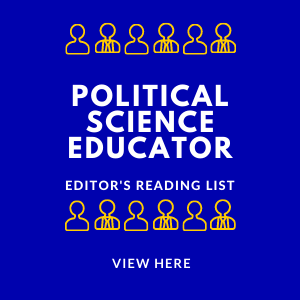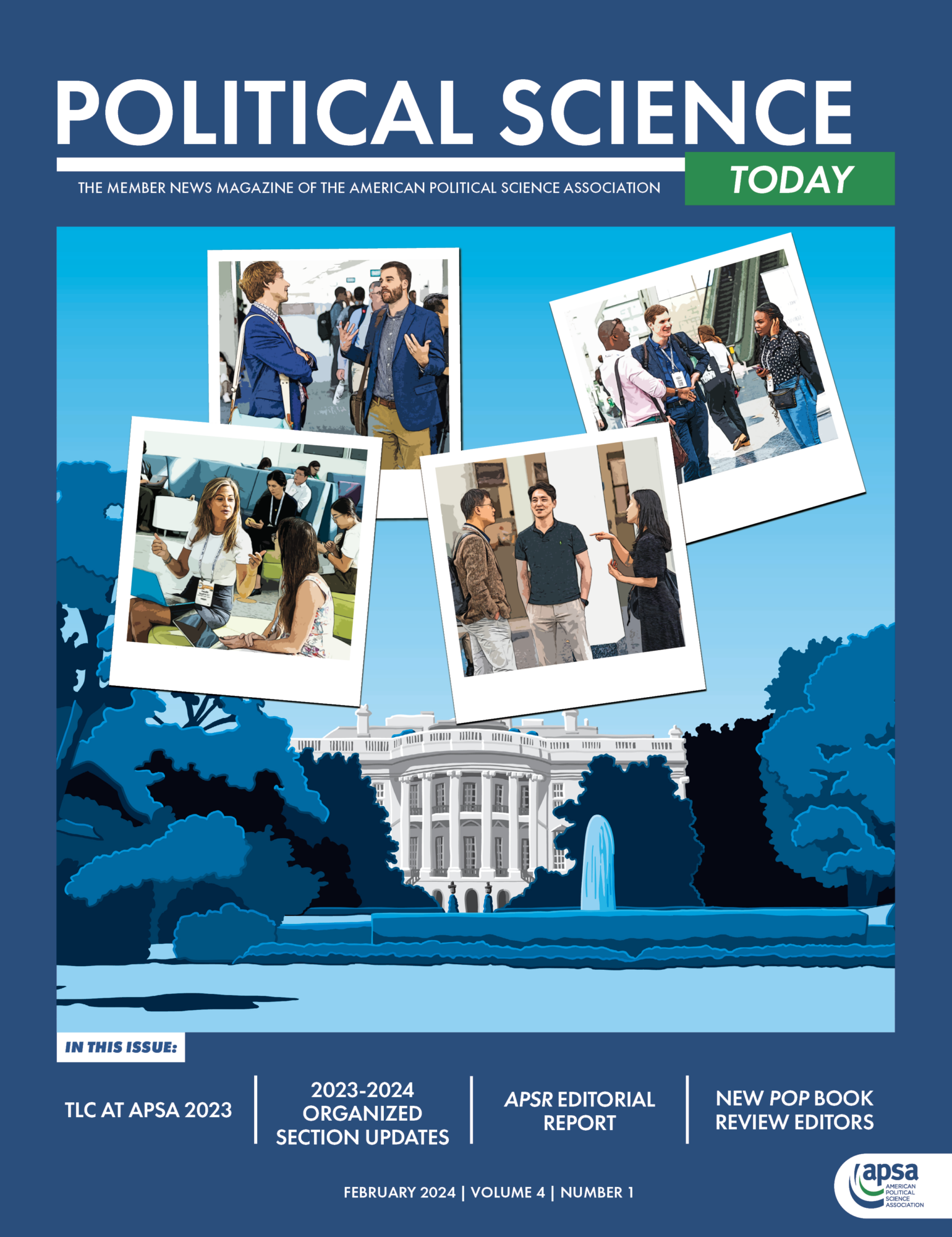Elizabeth A. Bennion, Indiana University South Bend
This essay originally appeared in the Political Science Educator’s Spring 2019 issue.
Instructors, program managers, and departments sometimes feel overwhelmed at the thought of creating an assessment plan. Keep in mind that the best assessment plans provide educators with useful and meaningful information to guide future practice. It is acceptable, even desirable, to focus on a few high-priority learning outcomes, areas in which assessors are seeking significant improvement. No instructor, department, or campus can assess all the learning that takes place on a college campus (or without the broader community). Focus on major goals and work to develop learning outcomes statements tied directly to those goals. Focus on working SMART, rather than assessing every conceivable learning outcome.[1] The SMART strategy to learning objectives focuses on creating objectives that are Specific, Measurable, Attainable, Relevant, and Targeted. Objectives should be realistic. They should be attainable for the target audience with the scheduled time and specified conditions. They should also be results-oriented and targeted to the learner and the desired level of learning.
In the area of civic education and engagement, one must determine what knowledge, skills, values, or behaviors are most important, or most directly related to the course, curriculum, program, or activities for which the assessment is taking place. One area to assess is civic knowledge. The type of knowledge you assess as “civic knowledge” is dependent, in part, on your disciplinary perspective.[2] Political scientists may emphasize knowledge of the legislative process, how a bill

becomes a law, or the role interest groups and lobbyists play in shaping public policy. Public administration programs might emphasize knowledge of government agencies, nonprofit organizations, bureaucratic decision-making processes. Meanwhile, Art courses might develop students’ understandings of the importance of the First Amendment in protecting artistic expression, the role of art in social and political debates, and the ways in which art can strengthen communities and address social problems.[3] Disciplines have diverse conceptual frameworks for understanding “citizenship” and delineating civic skills.[4]
Recognize that knowledge is dynamic, changing, socially constructed, and “implicated with power.”[5] For this reason, civic knowledge includes familiarity with key historical struggles, campaigns, and social movements, in addition to knowledge about fundamental principles and central arguments about democracy over time and the ability to describe the main civic intellectual debates within a discipline.[6] Civic knowledge also includes an understanding that “knowledge is actionable” and that when individuals join together to “co-create knowledge” it empowers them to make positive changes in the world around them.[7]
Alternatively, one may wish to focus on civic skills. Effective engagement requires a variety of skills. These include civic discourse and dialogue,[8] including dialogue across difference.[9] Mary Kirlin identified four major categories of civic skills: organization, communication, collective decision making and critical thinking.[10] Examples include organizing and persuading others to take action, navigating the political system, consensus building toward the common good, listening to diverse perspectives, and forming positions on public issues.
A third area for assessment includes civic identity. The term civic identity describes the aspect of identity that leads a person to take public action to solve community problems.[11] People with a strong civic identity view themselves as active participants in society and share a strong commitment to work with others to promote the public good. Numerous studies point to civic identity as an important factor inspiring civic engagement.[12] A sense of civic identity, when combined with relevant knowledge and skills and motivation, explains why people engage in politics and public action.[13] Civic identity includes both intellectual and ethical components (e.g. critical thinking skills and empathy for others). While these skills and dispositions may seem difficult to measure, tools are available. For example, participation in organized group during adolescence[14] and during college[15] contribute to formation of lifelong civic identity and engagement. Rubrics for measuring critical thinking and empathy are highlighted in an essay on existing assessment measures available in a separate edition of the Political Science Educator.[16] My colleague J. Cherie Strachan and I present an assessment tool for measuring the degree to which student organizations develop civic skills and identity here.[17]
To return to an earlier theme, the key is to start by determining your goals. No person or program can measure everything a student learns or administer all existing civic learning assessments. An extra-curricular leadership program may wish to focus exclusively on assessing the development civic identity among students. Meanwhile, an introductory survey course might focus on assessing civic knowledge, while a 200-level civic engagement workshop might focus on assessing civic skills. Start simple. Assess. Evaluate. Revise. Repeat.
References:
[1] The SMART framework is used (usually without attribution) by authors, centers, businesses, universities and others publishing in the area of learning outcomes assessment. The acronym traces back to a November 1981 issue of Management Review paper by George T. Doran called There’s a S.M.A.R.T. way to write management’s goals and objectives.
[2] Julie A. Hatcher. “Assessing Civic Knowledge and Engagement.” New Directions for Institutional Research 149 (2011): 81-92.
[3] See Chapter 13, “Fostering Civic Engagement through the Arts.”
[4] Richard M. Battistoni, Civic Engagement across the Curriculum: A Resource Book for Service-Learning Faculty in All Disciplines. (Providence, R.I.: Campus Compact, 2002).
[5] Hatcher, Assessing Civic Knowledge, 84.
[6] Caryn McTighe Musil, “Educating Students for Personal and Social Responsibility: The Civic Learning Spiral,” in Civic Engagement in Higher Education: Concepts and Practices, ed. Barbara Jacoby (San Francisco: Jossey-Bass, 2009), 49-68.
[7] Nicholas V. Longo and Marguerite S. Shaffer, “Leadership Education and the Revitalization of Public Life, in Civic Engagement in Higher Education: Concepts and Practices. ed. Barbara Jacoby (San Francisco: Jossey-Bass, 2009), 154-173.
[8] Cheryl Keen. “Measuring Dialogue across Difference as a Civic Skill.” Journal of College and Character 11 (2010): 1-8.
[9] Cheryl Keen and Kelly Hall. “Post-Graduation Service and Civic Outcomes for High Financial Need Students of a Multi-Campus, Co-Curricular Service-Learning College Program.” Journal of College and Character 10 (2008), 1-15.
[10] Mary Kirlin, “The Role of Civic Skills in Fostering Civic Engagement,” CIRCLE Working Paper 6. Center for Information and Research on Civic Learning and Engagement, University of Maryland, 2003.
[11] Another framework is to focus separately on civic knowledge, skills, values, and collective action. Caryn McTighe Musil provides a “Framework for Twenty-first Century Civic Learning and Democratic Engagement” in the AAC&U publication Civic Prompts https://www.aacu.org/sites/default/files/files/CLDE/CivicPrompts.pdf.
See Table 1 (page 5) for a useful delineation of the elements of this comprehensive approach designed to foster civic knowledge, skills, values, and collective action.
[12] Consult the bibliography for more information about studies of civic identity including Colby and Damon, 1992; Parks Daloz, Keen, Keen, and Daloz Parks, 1996; Colby and Sullivan, 2009; Knefelkamp, 2008; Youniss, McLellan, and Yates, 1997.
[13] Anne Colby and William M. Sullivan, “Strengthening the Foundations of Student’s Excellence, Integrity, and Social Contribution,” Liberal Education 95 (2009): 22-29.
[14] James Youniss, Jeffrey A. McLellan, and Miranda Yates, “What We Know About Engendering Civic Identity,” American Behavioral Scientist 40 (1997): 620-31.
[15] Terrell L. Strayhorn, “How College Students’ Engagement Affects Personal and Social Learning Outcomes.” Journal of College and Character 10 (2008): 1-16.
[16] Bennion, Elizabeth A. 2018. “Existing Assessments Measuring Civic Learning Outcomes among College Students.” The Political Science Educator 22 (1): 3-5.
[17] J. Cherie Strachan and Elizabeth A. Bennion, “Political Socialization and Student Life,” in Teaching Civic Engagement across the Disciplines, ed. Elizabeth M. Matto, Alison Rios Millett McCartney, Elizabeth A. Bennion, and Dick Simpson (Washington, DC: American Political Science Association, 2017).
Political Science Educator: Editor’s Reading List presents select PSE articles from the previous 15 years. APSA Educate is please to announce it will feature all future Political Science Educator‘s issues.





